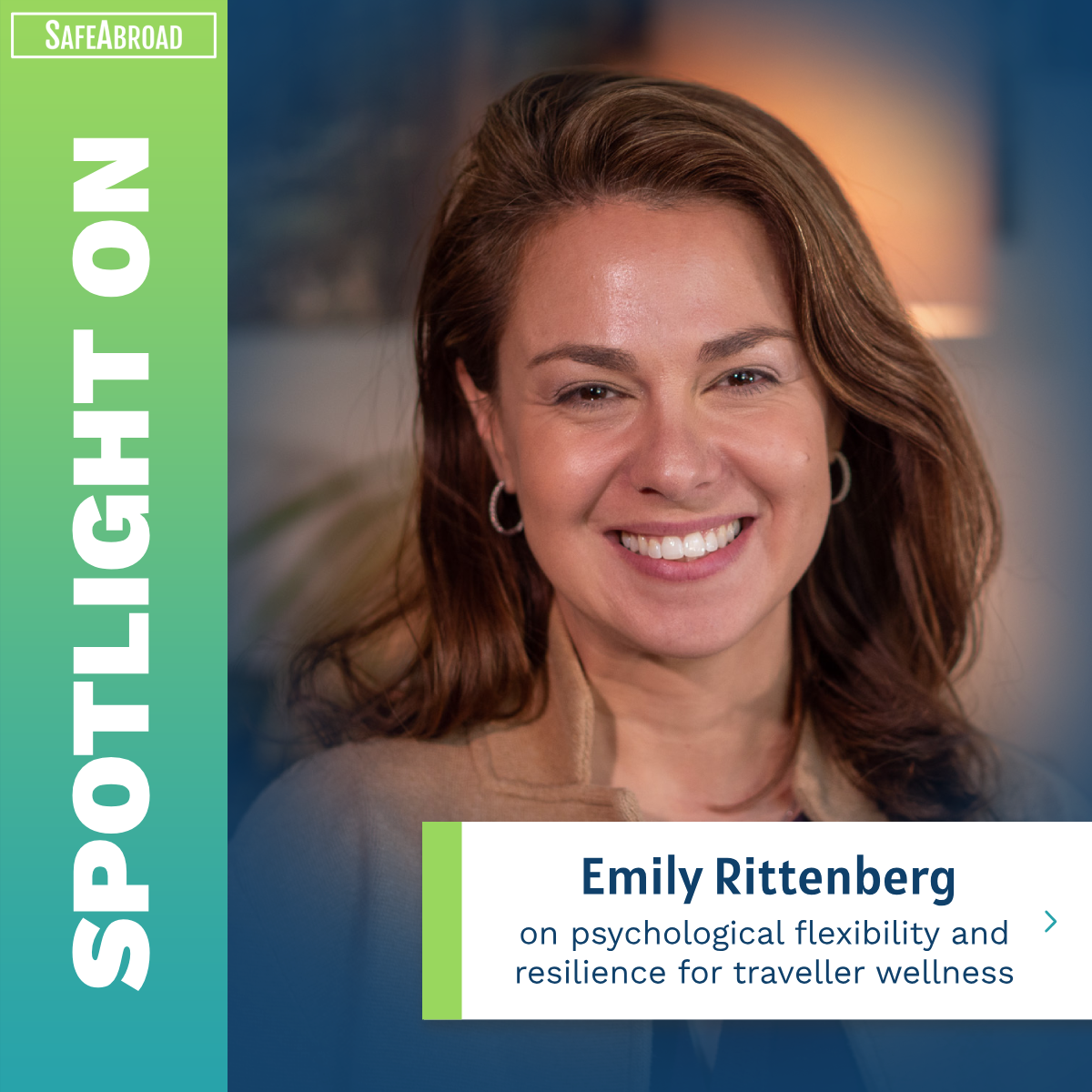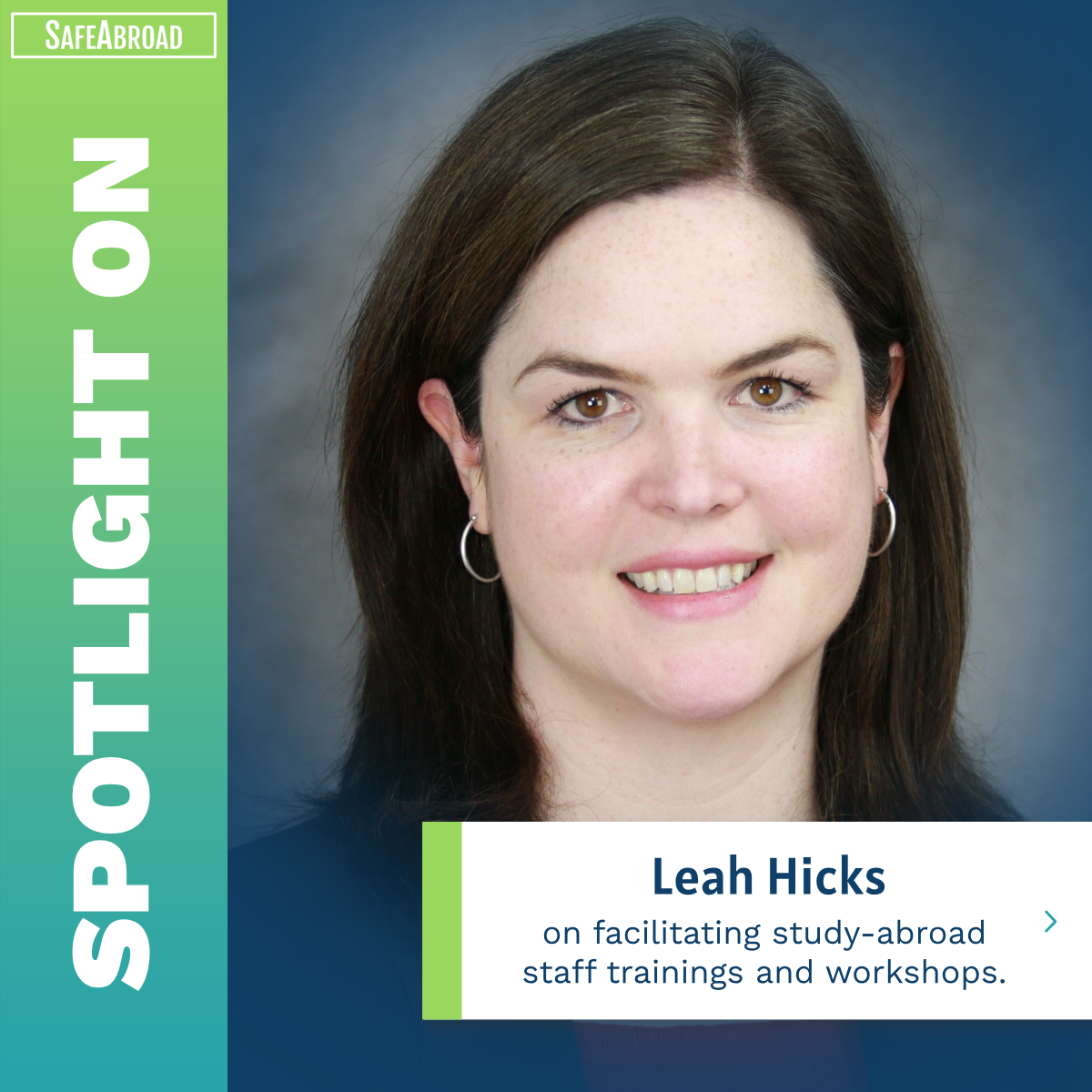Can you define psychological flexibility in the context of international education, and what makes it so important for students studying abroad?
Psychological flexibility is a word that we use that we use it kind of interchangeably with resilience. It is a term that came from acceptance and commitment therapy, a type of counseling that helps people accept difficult thoughts and feelings as a normal, common experience. The goal is to help free them from those difficult thoughts and feelings and move toward action. So, psychological flexibility can be understood as the capacity to be in the present moment, fully aware of one thoughts, emotions, and sensations, and being accepting of those, even the distressing ones.
Resilience is often thought of colloquially as being able to bounce back from stressful situations. As the co-founders of Being Well Abroad, Erin Blache and I are licensed therapists. We know that global education students are going to face distress, and that is an accepted normal part of going to a new country. Whether it be speaking a new language, eating new foods, having new experiences, being around different people, and maybe getting sick and not having your doctor nearby—there are so many things that can happen during a study abroad experience that can create these difficult thoughts, and we want to teach students that it is all totally normal. The goal is to flexibly shift their attention towards what their values are so that they can have a rich, full, and meaningful experience when they’re studying abroad.
How do you assess and address the mental health needs of students before, during, and after their time abroad?
We start with a disclosure to students about the importance of what we do. There are a lot of reasons why a student would not want to disclose their mental health status and history to a program or provider. In our pre-departure orientations for students, we address that and destigmatize it and speak genuinely with students kind to demonstrate that, understandably, there are a lot of reasons why you may not want to, but the program cannot be prepared to help you and to serve you the way you need if they don’t know. We also have our pre-departure mental health mini-course. It’s a 90-minute course that students take prior to departure to help them understand everything mental health-related that they need to know. This includes topics such as expectations emotionally while studying abroad, coping mechanisms, where to go if you need help, crisis phone numbers, etc. When students go through that course, they also create an individualized travel wellness plan. Every single student who takes the course walks away with a personalized document to rely on if they find themselves in need while abroad.
For staff training, we have created a pyramid of support. It’s the model that we train all of our staff on, and it’s the idea that there are different levels of mental health needs. We have it broken down into three levels. The lowest level is the universal interventions that programs should be doing for all students regardless of any indicated need. This includes ongoing mental health conversations and check-ins on the ground. The second tier is for students with an indicated need, because there are additional supports necessary at that point to make sure that the student is having a safe experience. The top tier is the crisis level. This includes preparation to plan and mitigate any potential crises ahead of time, and planning for what to do when there is an actual crisis on the ground with a student.
What role do faculty and on-site staff play in maintaining and promoting traveler wellness abroad, and how are they trained to handle these responsibilities?
A lot of times, study abroad faculty aren’t getting much training in mental health prior to departure, and yet they become the de facto therapists and leaders of the intervention if there is a need. At Being Well Abroad, we see a real opportunity for learning and growth with facilitators, which is why we created our facilitator training series. The relationship that a facilitator has with a student is a huge factor in promoting wellbeing and resilience. If a student in distress has a relationship with the facilitator, where they feel comfortable talking to the facilitator about what’s going on and how are things going, that can be protective in and of itself. The goal of our facilitator training is to show facilitators what to do in that kind of situation and to teach them that it’s okay to ask hard questions to your students. To show them that it doesn’t promote risk but instead actually helps them feel safe and supported.
In today’s climate, people are much more open to being asked those types of questions. It’s so accepted now and it’s expected to be able to open up and talk about wellbeing. This is an area where no institution is turning down this type of support for their students. Study abroad programs want to integrate this kind of thing. Unfortunately, it always comes down to the budget for these institutions. So, I think as we raise awareness about the possibilities for mental health support abroad, it’s going to pioneer a new standard for study abroad programming.
How do you balance proactive planning with the need to be prepared for crisis management?
It seems that the current model for most programs is to avoid a crisis by not talking about anything, and then when a crisis happens, no one is prepared. We believe staff must be trained to be proactive in mental health preparedness. They need to know what to do if a crisis arises, and they need to be monitoring for risks so they aren’t caught by surprise.
When I studied abroad in Israel back in 2000, the second intifada started. That was a major event that took place because major crises do happen while students are abroad. So, there must be a proactive plan to determine how the program will deal with crises. In terms of mental health for students, this means outlining support options, emergency numbers in the country, etc. There’s so much opportunity to make a crisis less impactful than it could be without any planning or preparation. According to the 2023 Education Abroad Forum Health and Safety report, 66% of behavioral or mental health incidents led to program withdrawal. That’s more than half of students experiencing some type of mental health need, that are leaving their programming. That’s expensive; it’s not good for the program, it’s not good for the staff, it’s not good for the other students in the program, and then it’s not good for the community. We think there is a huge opportunity to make that number significantly lower with planning and preparation. Students are already want to talk about mental health. Let’s take their lead and give them guidance on facilitating wellness while they’re, predictably, going to be distressed in some way.
How do you train staff and students to be proactive about their safety and aware of potential risks without causing unnecessary anxiety around mental health?
It’s about talking about mental health early and often and providing productive conversations. When we talk about mental health, it doesn’t make mental health worse. Talking about mental health with students who are already talking about mental health with each other, actually makes them feel safe and supported if they know that the adults around them are comfortable and capable of having these types of conversations. We’re not trying to eliminate student discomfort. We’re not trying to eliminate distress. We’re saying that is all a normal and expected part of the experience, and you can handle it.
The goal is to create a space of empathy and validation, and provide confidence in their ability to handle whatever comes their way while they’re abroad. But, there’s a nuanced way to go about it. Say there’s a student excited to go someplace that hadn’t considered the mental health implications ahead of time, and then these conversations open up and now they’re afraid to go. It has to be approached in a level-headed way, to promote awareness without instilling fear. That said, it’s a misconception that students will get scared when they’re thinking about their mental health abroad. What we have actually seen is that students feel better going abroad when they know mental health concerns have been addressed, and they feel more confident and, and more psychologically flexible.






